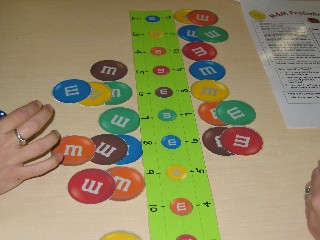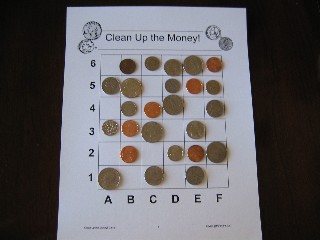We have our reading strategy down well--read, read, read. We read a lot to avoid summer setback in our reading skills. This seems to be the area most focused on.
As we recently did a math activity that involved simple addition, I realized my seven year old needed some extra attention for avoiding summer setback with math skills. I figured our day to day discussion in numbers would be enough, but it is not. Here is a list of websites where you can find math help. This list was compiled by Brayden's first grade teacher. This is such a valuable list of resources!
Math Baseball
Matho
CoolMath4Kids
Math Games with Dice
Money, Money, Money
Money Activities
Math Games
Math Worksheets
Lots of Math
Math Resources and Printables
Welcome!
This blog is here for you to find fun learning activities to do with your children. We share great ideas we find and love on the Internet, as well as ideas we come up with on our own! We also like to share resources we find helpful.
To find ideas for your child, click on the age range blog label or on the theme/topic you are looking for (on the left side of the page). In each post, we try to list optimal age ranges for the activity, but you must judge for yourself if it is appropriate for your child. When you try an activity out, please comment and let us (and everyone else) know how your child liked it!
Showing posts with label summer setback. Show all posts
Showing posts with label summer setback. Show all posts
Monday, July 30, 2012
Avoiding Summer Setback in Math
Wednesday, June 1, 2011
Avoiding Summer Setback
 |
| photo taken by Serra |
So I sat down at my computer armed with my research face, my books, and my notebook.
As I read journal articles, studies, and opinions, it all came back to the extraordinarily simple task of reading.
Read to your child. That is the main and best thing you can do.
There are, of course, other things you can do to help out. Here is my plan for the summer:
- Read Aloud Every Day: We already do this, and there is no way we could not do this unless we wanted a total mutiny, so this will easily continue on as it has. Some experts suggest 20 minutes a day, some 30. We tracked minutes for school this year and I found we were reading usually about 90 minutes a day total. Wow. I had no idea.
- Sustained Silent Reading: This is described in The Read Aloud Handbook by Jim Trelease. The basics of it is that you sit and read what you want in the same room as your child, who is sitting and reading what he wants (comics, magazine...whatever he wants--so long as it is morally okay with you). You then silently read to yourselves for 30 minutes. We have done this off and on. It gets hard during the school year, but is so fabulous. Brayden loved it even before he could read, so I know he will love it even more now that he can read to himself.
- Learning Activity: I plan to continue to have our daily learning activities over the course of the summer.
- Visit the Library: I plan to continue to visit the library at least every two weeks. We will also be participating in our library's summer reading program.
- Play Sports: We will play sports in our backyard together. A healthy body is part of having a healthy mind. We will also do swimming lessons, and we will attend sporting events. Watching a sport played helps you learn how it should be played.
- Go for Walks and Bike Rides: In Reading Magic by Mem Fox, Fox really stresses the importance of the child having a knowledge of the world to make reading meaningful (a point Trelease also stresses). Going for walks or bike rides gets your child acquainted with the area around you. These are slow-moving activities (at least compared to a car ride), so the child can really pay attention to things.
- Visit Local Museums: The benefits of this is the same as I mentioned above. This expands the child's knowledge of the world beyond his own neighborhood. This takes him into entire different worlds.
- Family Vacations: We will do some family vacations, and most of those will be camping. Again, vacations expand the child's view and knowledge of the world. Do you know what we will do on our drive there? A big thing will be listening to books on tape/CD.
- Attend Summer Activities: There are lots of local summer activities in a community. There are parades, fairs, and town festivals. Again, these expand the child's base knowledge.
- Free Play: We will also be sure to include plenty of free play with friends and family to allow for imagination growth.
- Structured Play: We will have structured playing time as well to help focus various skills.
- Piano: Brayden will continue to practice piano and will take piano lessons for part of the summer.
I think the two main themes here are very natural for parents to do on their own. One is to read to children each day. Have exposure to books. Visit the library.
The second is to expand your child's knowledge of the world. Take advantage of the fun events of the summer. Go for walks and hikes. Remember, a child's view of the world is so small; you don't need to go to Europe to expand the view. Going across town can do so.
Friday, May 20, 2011
Summer Reading Programs
| Image Source |
This is my first summer as a mom of a child who has been in school. I have been thinking about ways to prevent "summer setback"--and yes, I wrote a post on it last summer: http://learningdevelopmentactivities.blogspot.com/2010/08/preventing-or-minimizing-summer-setback.html
It has great ideas. I am working on coming up with a specific plan so we don't slide into complacency and accepting the "summer slide." Or so August 1 doesn't roll around and I think "ack! Summer setback!"
One of the most successful things you can do to prevent summer setback is reading. We read a whole lot at our house. Even so, I wanted to do something motivating for reading in the summer. Goals help people perform to their best ability, so I thought a summer reading program would be fun.
Our library has a free summer reading program available for people of all ages. The goal is simple: 20 minutes a day. But prizes are awarded for most minutes read.
They also have some fun craft projects, a magician, and they have rented out the local pool for a swim party for those who complete the program! Lots of fun.
So check your local library and see if they provide some sort of reading program. If not, you can create your own with goals and a fun prize at the end--maybe a trip for ice cream, a fun outing, or a new book!
Wednesday, August 18, 2010
Preventing (or minimizing) Summer Setback
What is "summer setback"? Simply put, summer setback is the lack of learning that happens to kids over summer break. A two year study found that all students had a slower gain of knowledge over the summer. The study also found that some students still have scores rise while others actually lower scores.
So how do you prevent the loss of skills?
As has been discussed on this blog, even we parents don't want to put all the gung-ho effort into learning activities that we do during a normal "school year." We are busy and we want a break. But taking a full break from learning activities can be detrimental to children.
There is good news.
I recently read The Read Aloud Handbook by Jim Trelease (which I absolutely love and 100% recommend...but more on that in another post). In it, he briefly discusses summer setback and ways to prevent it. Here are the factors that prevent/minimize summer setback (pages 87-89):
Why write this post now, at the end of the summer? Several reasons. One is that I just read this book last week, so the subject wasn't at my forefront. Another is I know if I wait until next May, I will forget all about it. Another is I hope that you will read this now and somehow remember it next summer and turn to it. Finally, because I know I am kind of a little nervous about summer setback in my own child. I do remember being aware of summer setback in myself. But this is a simple list. It involves easy things to do, and many of them are on the Simple Summer list, so perhaps it can help ease our (or my) own worries a bit.
So how do you prevent the loss of skills?
As has been discussed on this blog, even we parents don't want to put all the gung-ho effort into learning activities that we do during a normal "school year." We are busy and we want a break. But taking a full break from learning activities can be detrimental to children.
There is good news.
I recently read The Read Aloud Handbook by Jim Trelease (which I absolutely love and 100% recommend...but more on that in another post). In it, he briefly discusses summer setback and ways to prevent it. Here are the factors that prevent/minimize summer setback (pages 87-89):
- Model: model reading. This means that you read when your kids can see you read.
- Offer reading space: provide space for reading.
- Variety: provide a variety of reading materials. Examples are magazines, newspapers, and books.
- Bookstore/Library: visit the bookstore and/or library. See Library Day!
- Vacation: a vacation or summer camp out of town provides new experiences. They meet new people and see new things. This increases background knowledge and teaches new vocabulary words.
- Educational programs: when you watch TV and videos (and even listen to the radio), watch educational and informational programs.
- Read to child: Read to the child daily. See Simple Summer Fun: Reading. See also literacy blog label for more posts.
- Encourage child to read: even if your child can't "read," he or she can sit and look at books or magazines.
- Field Trips: visit the fire stations, museums, the zoo, etc. See Simple Summer Fun: The Zoo and Simple Summer Fun: Museums
Why write this post now, at the end of the summer? Several reasons. One is that I just read this book last week, so the subject wasn't at my forefront. Another is I know if I wait until next May, I will forget all about it. Another is I hope that you will read this now and somehow remember it next summer and turn to it. Finally, because I know I am kind of a little nervous about summer setback in my own child. I do remember being aware of summer setback in myself. But this is a simple list. It involves easy things to do, and many of them are on the Simple Summer list, so perhaps it can help ease our (or my) own worries a bit.
Labels:
back-to-school,
literacy,
simple summer,
summer setback
Subscribe to:
Posts (Atom)










